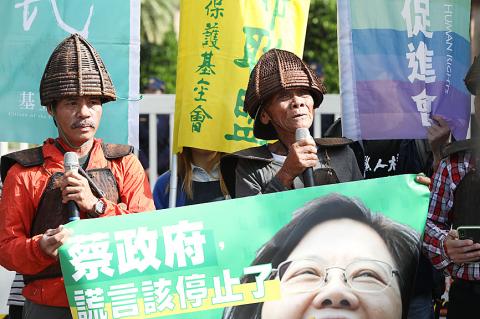Several members of the Tao Aboriginal community yesterday reiterated their decades-long demand that the government remove nuclear waste from Taitung County’s Orchid Island (Lanyu, 蘭嶼), saying that they would not accept the NT$2.55 billion (US$83.57 million) in compensation President Tsai Ing-wen (蔡英文) promised in the run-up to the Jan. 11 elections.
Since construction of a storage site was finished in 1982, more then 100,000 barrels of low-level radioactive waste have been transported from nuclear power plants on Taiwan proper to the outlying island, without obtaining residents’ consent in advance.
During a visit to Taitung on Friday last week, Tsai, who is seeking re-election as the Democratic Progressive Party’s (DPP) candidate, pledged NT$2.55 billion in damages to Lanyu’s Tao community.

Photo: Tu Chien-jung, Taipei Times
In addition, the government is to offer NT$220 million in compensation every three years until the nuclear waste is completely removed, Executive Yuan spokeswoman Kolas Yotaka said later that day, adding that guidelines for the reparations had last month been approved by Premier Su Tseng-chang (蘇貞昌) and that a fund management board that includes local residents would be established.
“We will not take a penny of the compensation, as we can catch fish and grow sweet potatoes to feed ourselves,” Tao elder and anti-nuclear power campaigner Capen Nganaen said yesterday at a protest in front of the Executive Yuan in Taipei, accompanied by environmental protection groups.
The Tao-language remarks by 83-year-old Capen, who in 2016 became a presidential adviser after accepting an apology to Aborigines by Tsai, were translated into Chinese by Syamen Fengayan, another Tao.
Tsai’s administration has not shown that it is sincere about wanting to relocate the nuclear waste and she is trying to buy off the Tao before the elections, Capen said, calling the president “a liar.”
Kolas said that Minister Without Portfolio Lin Wan-i (林萬億) — convener of a Cabinet task force formed to probe the truth about nuclear waste storage on Lanyu — had obtained consent for the compensation from the majority of Tao after talks over the past three years.
However, Lanyu Primary School president Syamen Womzas said that the decision to accept the compensation was not unanimous, adding that the Cabinet’s guidelines are not legitimate, as no advance notice was given before their publication.
The DPP government should enact a bill on compensation and nuclear waste disposal that passed a first reading at the Legislative Yuan three years ago, rather than adopt administrative guidelines, he said.
The NT$2.55 billion should instead be used as a budget for relocating the nuclear waste, Syamen Womzas said.
The government should establish a platform to discuss how to handle the nuclear waste and related compensation, while also continuing to reveal the storage site’s buried history, he said.
After meeting with Tao representatives inside the Executive Yuan, Lin told them he would deliver their opinions to Tsai and Su, the National Nuclear Abolition Action Platform said in a statement.
While Lin promised to continue delving into the site’s history, the statement cited him as saying that another budget would be allocated to relocate the nuclear waste, without elaborating.
Additional reporting by Lee Hsin-fang

Alain Robert, known as the "French Spider-Man," praised Alex Honnold as exceptionally well-prepared after the US climber completed a free solo ascent of Taipei 101 yesterday. Robert said Honnold's ascent of the 508m-tall skyscraper in just more than one-and-a-half hours without using safety ropes or equipment was a remarkable achievement. "This is my life," he said in an interview conducted in French, adding that he liked the feeling of being "on the edge of danger." The 63-year-old Frenchman climbed Taipei 101 using ropes in December 2004, taking about four hours to reach the top. On a one-to-10 scale of difficulty, Robert said Taipei 101

Nipah virus infection is to be officially listed as a category 5 notifiable infectious disease in Taiwan in March, while clinical treatment guidelines are being formulated, the Centers for Disease Control (CDC) said yesterday. With Nipah infections being reported in other countries and considering its relatively high fatality rate, the centers on Jan. 16 announced that it would be listed as a notifiable infectious disease to bolster the nation’s systematic early warning system and increase public awareness, the CDC said. Bangladesh reported four fatal cases last year in separate districts, with three linked to raw date palm sap consumption, CDC Epidemic Intelligence

Taiwanese and US defense groups are collaborating to introduce deployable, semi-autonomous manufacturing systems for drones and components in a boost to the nation’s supply chain resilience. Taiwan’s G-Tech Optroelectronics Corp subsidiary GTOC and the US’ Aerkomm Inc on Friday announced an agreement with fellow US-based Firestorm Lab to adopt the latter’s xCell, a technology featuring 3D printers fitted in 6.1m container units. The systems enable aerial platforms and parts to be produced in high volumes from dispersed nodes capable of rapid redeployment, to minimize the risk of enemy strikes and to meet field requirements, they said. Firestorm chief technology officer Ian Muceus said

MORE FALL: An investigation into one of Xi’s key cronies, part of a broader ‘anti-corruption’ drive, indicates that he might have a deep distrust in the military, an expert said China’s latest military purge underscores systemic risks in its shift from collective leadership to sole rule under Chinese President Xi Jinping (習近平), and could disrupt its chain of command and military capabilities, a national security official said yesterday. If decisionmaking within the Chinese Communist Party has become “irrational” under one-man rule, the Taiwan Strait and the regional situation must be approached with extreme caution, given unforeseen risks, they added. The anonymous official made the remarks as China’s Central Military Commission Vice Chairman Zhang Youxia (張又俠) and Joint Staff Department Chief of Staff Liu Zhenli (劉振立) were reportedly being investigated for suspected “serious